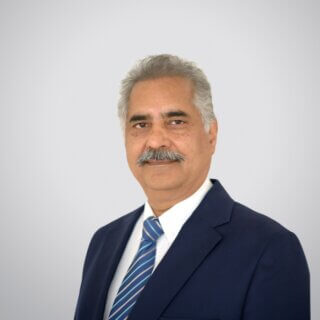At King’s, our Spinal Stenosis Surgeons have decades of experience treating spinal stenosis and are highly skilled operating on patients with this condition.
What is spinal stenosis?
Spinal stenosis is a painful condition caused due to the reduced or narrowing of the space in the spine, resulting in excessive pressure exerted on the nerves traveling along the spine. Spinal stenosis usually occurs in the neck region (cervical stenosis) and lower back (lumbar stenosis).
Spinal stenosis signs & symptoms
Most patients with spinal stenosis may not develop any symptoms. The symptoms tend to vary depending on the location of the stenosis and the nerves affected.
The signs and symptoms in the neck (cervical spine) include:
- Neck pain
- Numbness and tingling in the hands or legs
- Weakness in the hands or legs
- Difficulty in walking and maintaining balance
- Bowel and bladder dysfunctions with urinary urgency or incontinence
The signs and symptoms in the lower back (lumbar spine) include:
- Back pain
- Weakness in a leg or foot
- Numbness and tingling in a leg or foot
- Pain or cramps in one or both legs usually after standing for a long period of time
Spinal stenosis common causes
Spinal stenosis may occur at birth due to the development of a small spinal canal. There are a number of causes and risk factors including:
- Overgrowth of bones
- Spinal injuries
- Tumors
- Herniated disks
- Thickened ligaments
Spinal Treatment & Spinal Surgical options
Medications such as pain relievers, opioids, antidepressants, and anti-seizure drugs may be prescribed depending on the specific symptoms of the patients.
Surgery can be considered when other treatments have not helped or when the symptoms are severe. The goal of surgery is to relieve the pressure on the spinal cord and nerve roots by creating adequate space within the spinal canal.
Before surgery
Before surgery, the doctor may recommend some laboratory tests such as taking a blood sample to assess the patient’s general health.
During surgery
The surgical procedures for the management of spinal stenosis include:
- Laminotomy
During this procedure, only a part of the lamina big enough to reduce the pressure in a specific spot is removed.
- Laminoplasty
This procedure can be performed on the cervical spine. It helps to open up the space in the spinal canal by forming a hinge on a lamina.
- Minimally invasive surgery
It removes the bone and lamina to reduce the damage to the surrounding healthy tissue.
After surgery
Pain killers may be indicated to relieve pain and discomfort. Most patients are able to go home after a few hours of minimally invasive surgery.
Recovery period
Depending on the type of surgery performed, patients may need about 2 to 3 weeks to be able to resume their regular activities. Minimally invasive surgery might reduce recovery time.
Faqs
الأسئلة الأكثر شيوعا
Dr. Imtiaz Hashmi & Dr Nicandro Figueiredo are considered as the best Spine Surgeons in Dubai.
BOOK AN APPOINTMENT



